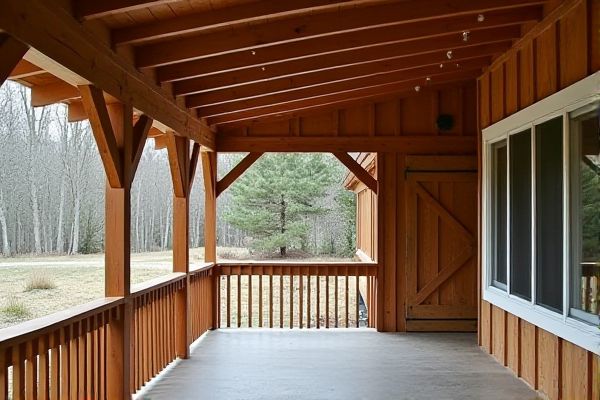
Timber frame porches offer natural aesthetics and warmth with excellent insulation properties, while steel frame porches provide superior durability, resistance to pests, and require less maintenance over time. Explore the rest of the article to determine which porch frame best suits your home's style and your practical needs.
Table of Comparison
| Feature | Timber Frame Porch | Steel Frame Porch |
|---|---|---|
| Material | Natural wood (pine, cedar, oak) | Galvanized or stainless steel |
| Durability | Moderate; prone to rot and insects if untreated | High; resistant to rust, rot, insects |
| Maintenance | Requires periodic sealing or painting | Low maintenance; occasional rust inspection |
| Cost | Generally lower initial cost | Higher initial cost but longer lifespan |
| Weight | Light to moderate | Heavier; requires stronger foundation |
| Aesthetic Appeal | Warm, natural look; customizable | Modern, industrial look; sleek design |
| Installation | Faster and easier DIY option | Requires professional installation |
| Environmental Impact | Renewable but can cause deforestation | Recyclable but energy-intensive production |
Introduction to Timber Frame and Steel Frame Porches
Timber frame porches offer natural warmth and classic aesthetics, constructed from durable wood species like cedar or oak that provide excellent insulation and traditional charm. Steel frame porches are engineered for superior strength and longevity, featuring materials such as galvanized or stainless steel that resist corrosion and require minimal maintenance. Your choice between timber and steel frames impacts not only the visual appeal but also the structural resilience and upkeep needs of your porch.
Material Overview: Timber vs Steel
Timber frame porches offer natural warmth, excellent insulation, and aesthetic appeal with varying wood types such as cedar, pine, or oak, while steel frame porches provide superior strength, durability, and resistance to pests and fire. Timber requires regular maintenance like sealing and treating to prevent rot and insect damage, whereas steel frames demand minimal upkeep and withstand harsh weather conditions without warping or rusting if properly coated. Choosing between timber and steel frames affects your porch's longevity, structural integrity, and overall maintenance needs aligned with your design preferences and environmental exposure.
Aesthetic Appeal and Design Flexibility
Timber frame porches offer warm, natural aesthetics with intricate wood grain patterns that enhance traditional and rustic home designs, while steel frame porches provide sleek, modern looks with clean lines suitable for contemporary architecture. Timber allows greater design flexibility for custom carvings and varied finishes, making it ideal for personalized, detailed craftsmanship, whereas steel excels in durability and supports larger spans and innovative shapes without compromising structural integrity. Your choice depends on whether you prioritize organic beauty and customizable textures or minimalist style with long-lasting, low-maintenance materials.
Structural Strength and Durability Comparison
Timber frame porches offer natural flexibility and aesthetic appeal but are susceptible to rot, insect damage, and warping over time without proper maintenance. Steel frame porches provide superior structural strength, resistance to weather, pests, and fire, ensuring greater long-term durability and minimal upkeep. The choice between timber and steel frames significantly affects the porch's lifespan and maintenance needs, with steel being optimal for heavy loads and harsh environments.
Weather Resistance and Maintenance Needs
Timber frame porches offer natural insulation and a classic aesthetic but require regular sealing or staining to protect against moisture, rot, and insect damage, especially in humid or rainy climates. Steel frame porches provide superior weather resistance due to their rust-resistant coatings and minimal susceptibility to warping or cracking, significantly reducing maintenance needs over time. Choosing steel ensures longevity with less upkeep, while timber demands consistent care to preserve structural integrity and appearance.
Environmental Impact and Sustainability
Timber frame porches offer a renewable and biodegradable option, with wood sourced from sustainably managed forests significantly reducing carbon footprint compared to steel. Steel frame porches require energy-intensive production processes and rely on finite mineral resources but benefit from high recyclability and long lifespan, which can mitigate environmental impact over time. Your choice should consider local material availability and lifecycle assessments to align with sustainability goals.
Cost Analysis: Timber Frame vs Steel Frame
Timber frame porches typically cost less upfront, with prices averaging between $15 to $30 per square foot, while steel frame porches range from $25 to $50 per square foot due to material and fabrication expenses. Timber offers lower initial investment but may incur higher maintenance costs from weathering and potential decay, whereas steel frames demand higher upfront costs but provide greater durability and reduced long-term maintenance expenses. Evaluating life-cycle costs, steel frames often prove more cost-effective over time despite higher initial prices, especially in regions with harsh weather conditions.
Installation Process and Construction Time
Timber frame porches typically require more intricate carpentry skills, leading to longer installation times averaging several days due to precision cuts and joinery. Steel frame porches benefit from prefabricated components and modular assembly, significantly reducing construction time often to just one or two days. The ease of steel frame installation also results in less on-site labor and fewer weather-related delays compared to timber frames.
Customization Options and Architectural Styles
Timber frame porches offer extensive customization with natural wood textures and the ability to incorporate intricate joinery, appealing to traditional, rustic, and craftsman architectural styles. Steel frame porches provide sleek, modern aesthetics with simpler lines and greater flexibility in creating large, open spaces, suited to contemporary and industrial designs. Both materials support diverse architectural expressions, but timber excels in warmth and detail, while steel emphasizes durability and minimalism.
Choosing the Right Frame for Your Porch
Timber frame porches offer natural warmth, aesthetic appeal, and excellent insulation, making them ideal for traditional or rustic designs. Steel frame porches provide superior strength, durability, and resistance to pests and weather, suitable for modern or industrial styles requiring low maintenance. Consider your climate, design preferences, and maintenance willingness when choosing the right frame for your porch to ensure long-term satisfaction and functionality.
 homyna.com
homyna.com